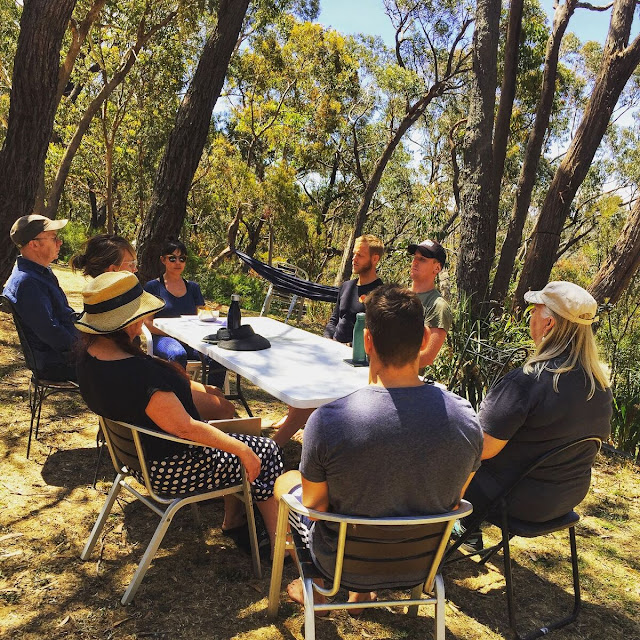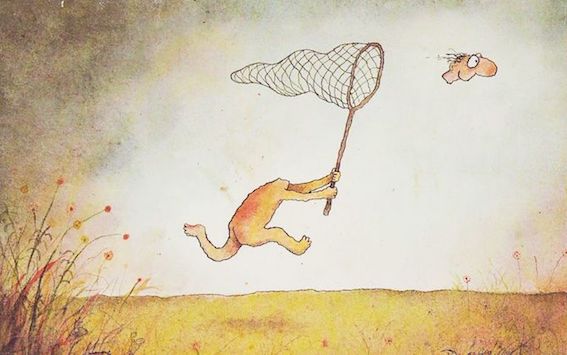The Well Academic Writing Retreat

Last December, I was lucky to be part of the inaugural Well Academic Writing Retreat in Wentworth Falls, the Blue Mountains. Created for research students and ECRs, the retreat was conceived by Dr Willo Drummond, a local Sydney poet and lecturer in creative writing at Macquarie University. Over several days, I delivered a number of workshops on mindful research and meditation as part of a broader program that integrated mind-body and self-care practices with the writing process. The following post offers reflections from Willo and myself on this wonderful event.
***
The Well Academic Writing Retreat was an intimate five day retreat for researchers interested in doing some intensive writing in a supportive environment. The pilot event was attended by seven participants, most of whom were Masters or PhD students, but diverse in age and discipline. As the name suggests, the retreat was designed with a strong focus on wellbeing and generating dialogue between participants. The program included ample writing time, mindfulness workshops, daily yoga classes, access to local bush walks and swimming, and nourishing food delivered in a comfortable social setting. Each day was bookended by short, facilitated discussion sessions in which participants talked about their daily project goals and reflected on their experience of, and relationship with, their work. In these sessions, writers were encouraged to keep the objective of self-compassion in mind.
The program design is based on the principle that thinking well, and thus writing well, involves mindfulness, movement and self-compassion. Mindfulness is necessary for cultivating awareness of our habits of thought and behaviour in both work and life. It allows us to see what is happening, as it happens, with more clarity, and thus relate to it with less judgement. In the writing context, it makes us more conscious of how we’re working, and better placed to respond to challenges as they arise. Movement is essential for general health and wellbeing. By incorporating regular movement practices into the schedule, the retreat encouraged participants to break up their time at the desk and return to it with fresh perspective. And finally, the retreat emphasised the importance of self-compassion: ‘being warm and understanding to ourselves when we suffer, fail, or feel inadequate, rather than ignoring our pain or flagellating ourselves with self-criticism’ (Neff 2020). Participants were encouraged to bring this attitude to their work and given regular opportunities to reflect and discuss how this effected their experience of writing.
 |
| A guided meditation practice to help everyone arrive in the space.
During the retreat, participants worked toward daily writing goals, but with an understanding that ‘achievement’ of these targets refers to much more than the number of words on the page. How we feel, how we respond to our needs, and the attitude with which we engage the messy, non-linear process of writing are equally important outcomes. Writers are not machines but living beings, and due to a range of needs (physical, cognitive and emotional) things may take more or less time than expected. We may need rest - perhaps more rest, or a different kind of rest - than we anticipated. We may need to pause, check in, take a walk, do some yoga, meditate or eat a snack. Rather than being separate from, or competing with, our work, these elements are fundamental to a sustainable writing practice.
|
Self-compassion (Willo)
At first glance, it might seem unusual to apply the concept of self-compassion to a competitive context like academia. Many of us are socialised us to believe that we need self-criticism to remain motivated, and in high-pressure environments such as the academy, this can lead to a fear that if we are too gentle with ourselves we will quickly descend into laziness. Given this, I presented the idea of self-compassion on the first day of the retreat with a little trepidation. My own experiences of the effects of self-criticism during the research writing process suggest that it drains energy and confidence, tending to shut down rather than engage the writing process, and this informed the design of this retreat. But I was curious to see if the value of self-kindness could be reconciled with the drive for productivity in others used to working in the ‘publish or perish’ climate of the university.
The proof was in the (nourishing and varied daily) pudding. Across the week, I witnessed both a physical softening and an emotional opening of participants as they learned to put self-compassion into practice. In addition to acknowledging their daily successes, they practiced listening to their physical, mental and emotional needs with an attitude of acceptance and encouragement instead of criticism. They experimented with allowing themselves rest in various forms (e.g. taking a nap, spending time in a hammock), and found they were able to access renewed creative energy and focus afterwards. Rather than encouraging idleness, self-compassion fostered a steady, supportive dynamic amongst the group that kept each writer motivated. Some attendees managed to write more over the week than in any other similar period to date. Several noted that the intellectual spaciousness afforded by a gentle, non-competitive environment was central to this experience.
From a biological perspective, self-compassion is an effective self-care tool as it activates the mammalian caregiving system, shifting us out of the fight-or-flight response that can be caused by incessant self-criticism and overly competitive environments (Neff 2013). This week reinforced for me that it’s when we are in a supportive space, both internally and externally, that we are able to do our best work.
 |
| Mixing it up - working in one of the communal spaces |
A change of environment (Michelle)
One of the advantages of attending retreats is the change of environment, which allows us to more clearly observe our internal lives and how these are affected by external circumstances. The seclusion, comfort and support found on retreat (e.g. beautiful surroundings, nourishing food, supportive company, quiet time) provide welcome respite from the demands of everyday life. In the absence of our usual commitments, we start to unwind. Slower, quieter settings present greater opportunities for self-awareness and reflection as there’s simply less to distract us from ourselves. In these environments, our underlying states of mind and body tend to surface.
I observed this in my experiences of teaching and writing on retreat. I was struck by how much the shift in environment - from city to bush, academic to non-academic space, fast to slow - changed how I related to my work and to others. From the moment I arrived, I noticed a pervasive sense of ease (a lowering of pressure) in the space and among participants that I rarely experience at the university. Everyone there seemed calm and more present. When delivering my workshops, I felt the unspoken hierarchy between teacher and student loosen and give way, and the act of teaching felt very natural. The slower sense of time and shared retreat space made room for relaxed, authentic interactions and some surprising conversations. During periods of writing, I felt more connected to the process than usual. Though initially difficult, I was able to settle and find my focus more quickly in each sitting and was aware of really enjoying the work.
The format of the retreat helped me to find my rhythm in the space. I developed a routine that included teaching, writing, swimming, walking, meditating and spending quiet time in the bush. I heard this sentiment echoed by others - the retreat schedule gave the days structure and balance, while also allowing participants space to experiment with the conditions that suited them best. The event served as a timely reminder of the conditions (external and internal) under which I do my most rewarding teaching and writing. I’m looking forward to the next instalment in July.
The Well Academic Writing Retreat will run again in July and December 2020. For details visit www.thewellwritingretreats.com or email willo@thewellwritingretreats.com
 |
|
An ideal place for thinking well - the view from one of the writing desks.
|



This comment has been removed by a blog administrator.
ReplyDeleteThis comment has been removed by a blog administrator.
ReplyDeleteThis is a wonderful essay you have posted. This is a useful method of expanding our understanding. Please keep sharing articles of this nature.Meditation Retreat Arizona
ReplyDeleteThe Well Academic Writing Retreat sounds like a tranquil setting in which many writers could start to seriously begin to work productively on writing, without being interrupted. These types of retreats enhance creativity and clarity. As surely as retreating to work on a project brings focus, having student support, especially within a demanding discipline like law, can induce significantly productive writing. A law coursework writing service UK could be one of these helpful supports.
ReplyDeleteThis retreat sounds like an incredible opportunity for students to improve their skills in a focused environment. I love how it emphasizes both creativity and structure in academic work. For those struggling with deadlines or complex assignments, seeking academic writing help online can complement experiences like this retreat, providing additional guidance and support. Combining professional help with immersive workshops like this can truly elevate your writing and boost confidence in tackling challenging academic projects.
ReplyDelete